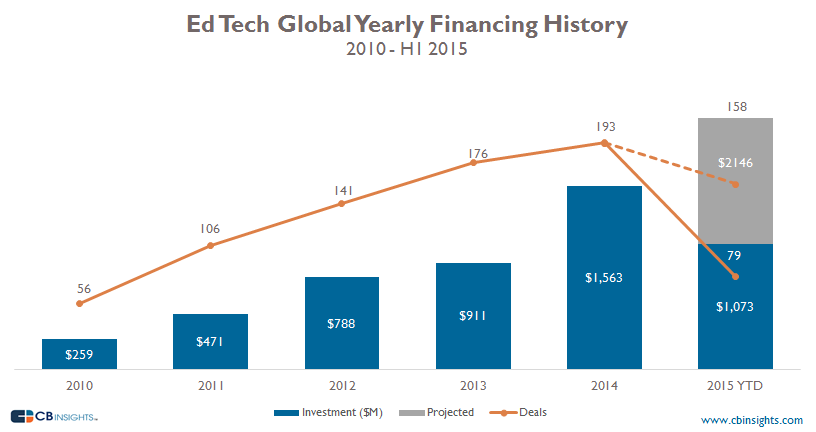Funding & Business
Funding To VC-Backed Education Technology Startups Grows 503% over 5 Years

Investments in education technology totaled $641M in Q1’15 alone.
Funding to education-technology companies is booming. Overall, the period from 2010 to 2014 saw more than a 503% growth in investment dollars.
The pace has held high even in recent quarters. Financing grew from $911M in 2013 to over $1.5B in 2014, a 71% increase year-over-year. In the last four quarters, including Q2’15, ed tech startups attracted $1.9B, a jump of 68% compared to the previous four quarters.
Meanwhile, deal count has carried along steadily. There were 193 deals in 2014, up from 176 in 2013. However, at the current run rate 2015 will see a deal count of 158, well below that of previous years which indicates that deals are becoming fewer yet larger. Note: This data only includes funding to VC-backed companies in the Ed Tech space.
Quarterly deals and dollars
The quarterly breakdown below reveals the recent surge in ed tech funding and deals. Q1’15 set a new high for ed tech financing, with a total of $641M in funding (equal to about 41% of the dollars going to ed tech in all of 2014).
The largest round in Q2’15 was a $100M investment in China-based education app developer Changingedu by Sequoia Capital China, among other investors. The biggest Q1’15 deal was $186M in growth equity to education and training site Lynda.com, in a round that included Accel Partners, Meritech Capital Partners, Spectrum Equity Investors, and TPG Growth. Lynda.com was later acquired by LinkedIn in Q2’15 for $1.5B.
Deals by investment stage
Looking at ed tech funding by investment stage we see a trend toward early-stage investments. The deal share of early-stage deals ramped up from 41% in 2011, to 69% in 2013. Since then, it’s held relatively high; in the first six months of 2015 early-stage deal share was 21%. Meanwhile, mid-stage investments have accounted for a growing share of deals, going from a 20% share in 2012, to 24% in 2014. Late-stage dollar share has also grown slowly, from 4% in 2011, to 7% in 2014, and up to 13% in the first half of 2015.
The dollar share breakdown by investment stage is far more variable. Early-stage deals represented a range of 23% to 40% of dollars invested from 2010 to 2014. In that time, middle stage dollars slid from from 58% to 51% of dollars invested. And late-stage deals saw a range of 10% to 35%, currently accounting for 28% of dollars in the first half of 2015.
Most active investors
The most active ed tech investor is NewSchools Venture Fund with investments in over 35 unique companies. NewSchools’ largest deal was their participation in a $23.5M Series D funding to electronic school-transcript company Parchment in 2012. NewSchools has also invested in Teachscape and Kidaptive. Second on the active ed tech investor list is 500 Startups, followed by Kapor Capital and Learn Capital.
500 Startups is the most active early-stage VC, with a majority of its investments going to early-stage companies. 500 Startups’ largest early-stage investments include seed deals to online learning companies Tynker and Colingo. NewSchools Venture Fund and Kapor Capital are tied for second most active.
Pluralsight, an online course company, is the most well-funded with a total of $203.5M invested by backers including Felicis Ventures and Insight Venture Partners. Learning platform Desire2Learn is second with $165M invested by Silicon Valley Bank, among others.
Looking for the most comprehensive set of private company Ed Tech financing and exit data? Check out the CB Insights Venture Capital Database. Sign up free below.
If you aren’t already a client, sign up for a free trial to learn more about our platform.
Funding & Business
Spirit Airlines Bankruptcy Tees Up Painful Cuts in Survival Bid

Spirit Aviation Holdings Inc.’s second bankruptcy filing in a year signals that the low-cost carrier is finally facing up to the painful steps needed to ensure its survival.
But its board faces daunting challenges on the path ahead, including how to downsize its fleet of leased aircraft while managing the roller coaster market conditions for US air travel that complicate the prospects for a long-term recovery.
Funding & Business
Rising US Corporate Debt Ahead With $1 Trillion in Deals

US companies are poised to boost their debt levels to help fund a $1 trillion wave of acquisitions, a reversal after years of scaling back their borrowings.
Keurig Dr Pepper Inc. this week said it’s buying coffeemaker JDE Peet’s NV and funding the deal with a €16.2 billion ($19.0 billion) bridge loan. AT&T Inc. said on Tuesday it’s buying spectrum licenses from EchoStar Corp. for about $23 billion, a move that will probably be at least partly funded with bonds.
Funding & Business
Watch EU Foreign Ministers Meet to Discuss Trade Agreement
-
Tools & Platforms3 weeks ago
Building Trust in Military AI Starts with Opening the Black Box – War on the Rocks
-

 Ethics & Policy1 month ago
Ethics & Policy1 month agoSDAIA Supports Saudi Arabia’s Leadership in Shaping Global AI Ethics, Policy, and Research – وكالة الأنباء السعودية
-

 Events & Conferences3 months ago
Events & Conferences3 months agoJourney to 1000 models: Scaling Instagram’s recommendation system
-

 Jobs & Careers2 months ago
Jobs & Careers2 months agoMumbai-based Perplexity Alternative Has 60k+ Users Without Funding
-

 Funding & Business2 months ago
Funding & Business2 months agoKayak and Expedia race to build AI travel agents that turn social posts into itineraries
-

 Education2 months ago
Education2 months agoVEX Robotics launches AI-powered classroom robotics system
-

 Podcasts & Talks2 months ago
Podcasts & Talks2 months agoHappy 4th of July! 🎆 Made with Veo 3 in Gemini
-

 Podcasts & Talks2 months ago
Podcasts & Talks2 months agoOpenAI 🤝 @teamganassi
-

 Jobs & Careers2 months ago
Jobs & Careers2 months agoAstrophel Aerospace Raises ₹6.84 Crore to Build Reusable Launch Vehicle
-

 Mergers & Acquisitions2 months ago
Mergers & Acquisitions2 months agoDonald Trump suggests US government review subsidies to Elon Musk’s companies


